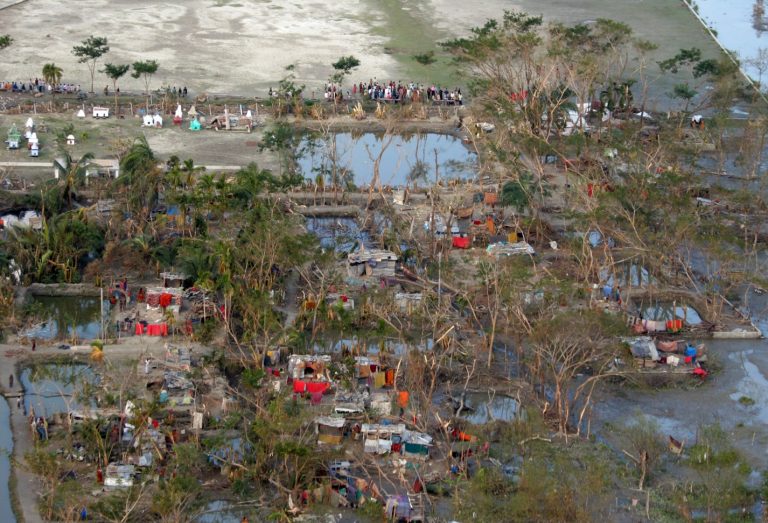Human Rights
Projects
Support to Threatened Island Nations
The Sabin Center has conducted extensive research on the legal implications of climate change for small island nations and has hosted events to discuss these topics with key stakeholders. We have also assisted delegations from these countries during international climate negotiations, in part through our work with the Legal Response Initiative.
Oslo Principles on Global Climate Change Obligations
On March 1, 2015, a group of experts in international law, human rights law, environmental law, and other law adopted the Oslo Principles on Global Obligations to Reduce Climate Change. Michael Gerrard, faculty director, was among the experts who contributed to this project. View the commentary on the principles here.
Human Rights and the UNFCCC
The Sabin Center engages with the UNFCCC secretariat and parties to ensure that human rights are adequately accounted for in international agreements and implementing actions.
- We worked with UNEP to submit a report on Climate Change and Human Rights to the UNFCCC in advance of COP 21 in Paris.
- More recently, we submitted a letter to the UNFCCC secretariat requesting that human rights safeguards be incorporated into the Sustainable Development Mechanism created under Article 6 of the Paris Agreement.
Philippines Carbon Majors Investigation
In December 2016, Michael Burger and Jessica Wentz submitted an amicus brief to the Philippines Commission on Human Rights in support of a petition requesting an investigation into the responsibility of the “Carbon Majors” for human rights violations resulting from the impacts of climate change. The submission outlines the various ways in which climate change interferes with the enjoyment of human rights in the Philippines and around the world, and explains why the private companies can and should be held accountable for human rights violations arising from their contribution to climate change.
Michael Burger and Jessica Wentz also contributed to a Joint Summary Brief which consolidates and summarizes key messages contained in amicus briefs in support of the petitioners in this investigation.
Climate Change in the U.S. Universal Periodic Review
The United States underwent its second Universal Periodic Review (UPR) before the United Nations Human Rights Council in 2015. The Sabin Center worked with other stakeholders to encourage consideration of climate change and its human rights implications during the 2nd UPR. Writen submissions included:
Written Statement of Michael H. Burger, Executive Director, on Climate Change and Human Rights, UPR Civil Society Consultation (February, 2015)
Protecting the Human Rights of Persons Displaced by Climate Change, submitted to the U.S. Department of State in advance of the 2nd UPR (May 2015)
Advance Written Statement of Michael H. Burger, Executive Director, on Climate Change and Human Rights, UPR Town Hall & Civil Society Consultation (July, 2015)
Featured Publications
Human Rights and Article 6 of the Paris Agreement: Ensuring Adequate Protection of Human Rights in the SDM and ITMO Frameworks, Romany Webb and Jessica Wentz (May 2018)
Article 6 of the Paris Agreement authorizes the use of market-based mechanisms known as “internationally transferred mitigation outcomes” (ITMOs) to reduce greenhouse gas emissions, and establishes the Sustainable Development Mechanism (SDM) as a framework for coordinating international mitigation efforts . This paper discusses different approaches to ensuring human rights are protected under Article 6. We consider, as one possible approach, whether and how social and environmental safeguards could be incorporated into the rules governing ITMOs and the SDM. We find that there is a compelling policy rationale for incorporating safeguards into both the ITMO and SDM frameworks, not only to prevent human rights abuses, but also to ensure the success of ITMO and SDM programs and projects.
Sadly, The Paris Agreement Isn’t Nearly Enough, Michael Gerrard (September 2016)
This article explains why the international pledges submitted for the Paris Agreement are not enough to avoid serious impacts on people and communities – specifically, impacts leading to the displacement of millions of people from their home.
Climate Change and Human Trafficking After the Paris Climate Agreement, Michael Gerrard (June 2016)
This is a transcript of a presentation delivered at the Judges’ Summit on Human Trafficking and Organized Crime Pontifical Academy of Social Sciences. It discusses how climate change will affect displacement and human trafficking and the extent to which the Paris Agreement will address these key problems.
Climate Change and Human Rights, Michael Burger and Jessica Wentz (UNEP, December 2015)
This report, commissioned by the United Nations Environment Programme (UNEP), describes the nexus between climate change, environmental degradation, and the impairment of fundamental human rights, such as the rights to food, water, housing, and life. It explains how governments and other actors can address climate change in a manner consistent with their obligations to respect, protect, promote and fulfill human rights. The report was released during COP21 to help inform the development of the Paris Agreement.
Designing a Climate Change Displacement Coordination Facility: Key Issues for COP 21, Jessica Wentz and Michael Burger (September 2015)
In the lead up to COP 21, there were several proposals to include provisions for the creation of a “climate change displacement coordination facility” in the Paris Agreement. This briefing note highlights some of the functions that the displacement coordination facility could fulfill, as well as some key questions for negotiators in the lead-up to COP 21 and subsequent talks. The note is not intended to be a proposal for how the facility should operate, nor do the functions highlighted below necessarily reflect what is politically or economically feasible. Rather, the note is intended to outline a broad array of considerations for decision-makers as they contemplate whether and how to proceed with the displacement coordination facility.
All publications on human rights are available here.
Additional Resources
Literature Review: Climate Change and Human Rights, Nikita Perumal (September 2015)
This document contains a review of publications that deal with the nexus between climate change and human rights.




